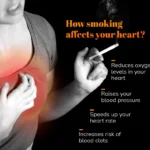Winter is the time for celebrations and fun activities – but not for your heart! Besides the common cold and flu, the winters bring several possible threats to heart patients, which may even turn fatal.
In winter, your heart has to work twice as hard to pump oxygen throughout the body to keep you warm while the cold temperature causes the arteries to constrict, thus restricting the flow of blood and reducing the supply of oxygen to the heart muscles. Due to this, the chances of developing blood clots and having a stroke or heart attack are higher during winter.
Besides, as the temperature starts to fall, your blood pressure and cholesterol levels start shooting up, thus putting you at an increased risk of a heart attack.

Here are a few instances where a person may be exposed to a host of cardiovascular ailments:
Overexertion
Going for a run or brisk walking in harsh, cold weather can cause exertion, thereby increasing the demand for oxygen to the heart. People with an arterial blockage may not be conditioned for such strenuous outdoor activities.
Exposure to Cold
Sudden exposure to the cold can cause the blood vessels to clamp down, blocking the flow of blood and causing the skin to turn blue due to the sharp drop in oxygen levels. A person in this situation is known to be having a vasospastic attack.
Overheating
While dressing in warm clothes is important to keep your body heated in winter, try avoiding performing vigorous exercises in heavy, warm clothing. This is important because your body will need to release the heat when you are overheated. Too much warm clothing can prevent that from happening and cause the blood vessels to dilate. This may lower your blood pressure drastically, triggering a heart attack.
Influenza
Seasonal flu can also lead to a heart attack in patients at risk. Fever due to the flu makes your heart beat rapidly, thus increasing oxygen demand. Your blood pressure may also drop below normal due to dehydration, which again, reduces oxygen supply to the heart muscle. The lack of supply of oxygenated blood can cause a heart attack in winter.
What Are the Common Winter Heart Conditions
Heart patients are vulnerable to the following cardiac conditions during winter:
Hypothermia
This refers to a medical condition wherein the body loses heat faster than it can generate. Hypothermia causes the body temperature to plummet below the normal range i.e. 98.6F. In hypothermia patients, the body temperature falls below 95F.
Signs of hypothermia include:
- Shivering
- Fatigue, exhaustion
- Drowsiness
- Slurred speech
Angina
Angina is itself a symptom of Coronary Artery Disease, which occurs when the heart does not receive sufficient oxygenated blood. Due to restricted blood flow in winter, a person may experience angina pectoris.
Angina symptoms include:
- Chest pain and discomfort that lasts several minutes
- A squeezing pressure in the chest
- Tightness or heaviness in the chest
- Sweating and shortness of breath
Tips to Ensure Heart Health in winter
- Stay indoors on cold days and keep your home warm. You can use an electric blanket or a hot water bottle at home.
- Stay active, and move around more often even when you are not performing strenuous exercises.
- Wear warm, thin layers of clothing when stepping outdoors.
- Have a warm bowl of soup or broth to warm yourself up.
- Eat a balanced diet comprising leafy greens and seasonal fruits, whole grains, healthy fats etc.
- Cut back on alcohol and carbonated drinks.
- Quit smoking if you haven’t yet.
- Exercising regularly, eating right and maintaining a healthy lifestyle will help to improve your heart health not only during winter but in all seasons.
- The cold weather can spell trouble for your heart. Some cardiac conditions may call for emergency treatment. Hence, it is best to look out for the symptoms and consult a doctor right away. Delays in diagnosis and treatment can be fatal or increase the risk of complications.
Heart Attack Warning Signs and Symptoms
- Acute (severe) chest pain is the most common warning sign of heart attacks.
- Other heart attack symptoms include:
- Nausea or vomiting
- Dizziness
- Shortness of breath
- Pain, numbness or tingling in your jaw, back, neck or shoulders
- Cold sweat
- Sensation of heartburn
- Sudden fatigue
Keeping your heart healthy all year can help you stay in the best possible shape when winter rolls around.
These tips are always in season:
- Stick to a heart-healthy diet.
- Be sure to exercise regularly.
- Know your blood pressure, cholesterol and blood sugar numbers, and work with your physician to keep them in normal range.
- Take steps to manage stress.
Listen to your body and if you feel different, see your physician


